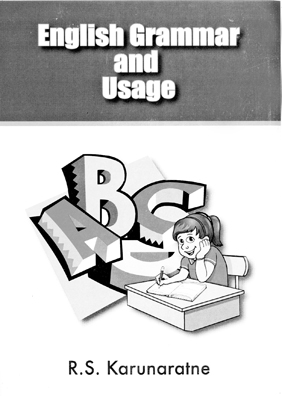Book Review
English for real life
Reviewed by Prof. D.C.R.A. Goonetilleke
English Grammar and Usage, the latest book by R.S. Karunaratne, draws
on his long years of experience as a teacher and Visiting Lecturer in
English. This enables him to address the needs of the Sri Lankan learner
in a manner that eludes the foreign English consultants and foreign
authors of textbooks.
 He
avoids the conceptual mistakes of the Presidential Task Force in English
of the previous government. It was entrusted with the admirable aim of
improving English skills island-wide, but the implementation was a
costly failure. It decided to use two registers to teach English: Sri
Lankan English for speech and International Standard English for
writing. He
avoids the conceptual mistakes of the Presidential Task Force in English
of the previous government. It was entrusted with the admirable aim of
improving English skills island-wide, but the implementation was a
costly failure. It decided to use two registers to teach English: Sri
Lankan English for speech and International Standard English for
writing.
Sri Lankan English is discernible in practice, but it has no
generally accepted and recognised standard form as yet. Moreover, to
make an issue of it is unnecessary: Sri Lankans will speak as Sri
Lankans as a matter of course. If one teaches some sort of Sri Lankan
English, whatever that may mean to diverse teachers, the result is
likely to be that the learners will produce less desirable versions.
International Standard English
An attempt to teach writing through what has been called
International Standard English is a non-starter: such a variety of
English does not exist. Of course, teaching English by means of two
registers is itself not a pedagogically advisable procedure. Normal
people speak and write in much the same way, except that, in writing,
some colloquial features are eschewed. Karunaratne, in his book, wisely
does not make the varieties of English, real or imaginary, an issue.
Rather, he proceeds to teach the kind of English, which educated Sri
Lankans use. In the first part, he takes into account the whole range of
grammar that a learner needs - from active and passive voice, through
nouns to verb forms. Teaching prepositions bulks large, quite rightly,
as this is an aspect of language that the second-language learner finds
particularly difficult to master.
Karunaratne is aware that not only grammar but usage forms an
important ingredient in sentence construction. He devotes the second
part of his book to usage. Some aspects of language cannot be explained
in terms of grammar, but only in terms of usage handed down, and
altered, through the ages. For example, the distinction between 'shall'
and 'will' is purely a matter of usage. It was important earlier, but
now the distinction is blurred.
Teaching grammar
Teaching grammar has been an issue in English Language Teaching.
Karunaratne belongs to the school which believes in teaching grammar
directly. Others think grammar is best taught indirectly while adopting
different approaches. Whatever the approach, grammar and usage are
important. They are sinews of the language.
Karunaratne's lessons are rich in examples. He provides explanations
which the intelligent learner will require. The exercises are
accompanied by a key, which will assist especially those engaged in
self-study. Altogether, the book will foster in the learner an ability
to use the language creatively: s/he will be able to use the language in
unpredicted situations in real life outside its pages. |

